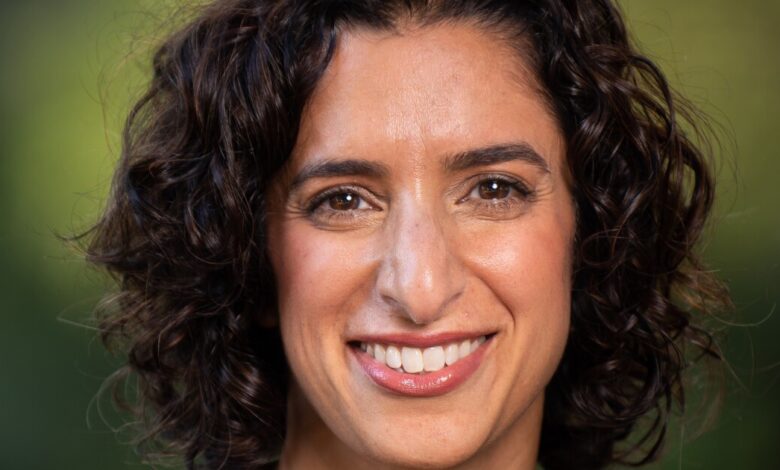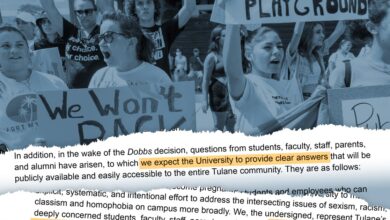When Considering the Fairness of Race-Conscious Admissions, Don’t Forget to Get Over Yourself

[ad_1]
Nope, sorry. There’s not just one way of looking at fairness. Nor is there a single, fixed, objective definition of merit, excellence, awesomeness, or “the best.”
Natasha K. Warikoo reminds us of those truths in her new book, Is Affirmative Action Fair? (Polity Press). The concise, conversational riff on race-conscious admissions arrives as many college leaders are bracing for what could be the end of the world as we’ve known it since 1978. That year, in Regents of the University of California v. Bakke, the Supreme Court upheld the consideration of race as one of several factors in admissions. But the landmark ruling, affirmed by Grutter v. Bollinger in 2003, is in peril. On Halloween, the high court will hear two legal challenges to race-conscious programs, at Harvard University and the University of North Carolina at Chapel Hill. Because conservatives hold a 6-to-3 majority, it’s safe to predict that the legal precedents underpinning the way many selective colleges craft their classes will soon crumble.
Warikoo, a professor of sociology at Tufts University, wrote the bulk of Is Affirmative Action Fair? before the Supreme Court agreed last winter to hear the Harvard and UNC cases. Though it’s impossible to read the book without considering the implications of the looming showdowns in Washington, D.C., she didn’t set out to write a legal analysis or a how-to book for colleges anticipating the aftermath of the court’s decisions, which are expected by June 2023. Instead, she threads the age-old debate over race-conscious admissions into deeper questions about justice, the purpose of higher education, and the hazard of viewing admissions solely with an individualistic lens.
Some people think of an acceptance from a big-name college as an award, or what Warikoo calls the “certification of an individual’s worthiness or deservingness.” That’s a narrow view, she argues, of all that’s at stake in the vast admissions enterprise. And that view can make it harder to see the question of fairness in broader terms. Reducing the complexity of race-conscious admissions to whether or not it’s fair to Johnny GPA might be tempting, but she invites readers to consider what else is at stake for underrepresented-minority students in a society full of racial inequities.
“It’s important for people to understand what we could lose here and why it’s important for society,” Warikoo says. “So much of how we think about racial equity runs right through education. The question of how to address educational inequity in a racially unequal society will continue to be something that we need to think hard about, regardless of what the court decides.”
The Chronicle recently caught up with Warikoo for a discussion of race, merit, and the powerful impulse that drives us to slap college stickers on the back of our cars. The conversation has been edited for length and clarity.
The title of your book poses a question: Is Affirmative Action Fair? But you conclude that this is the wrong question to ask. Why is that?
So the question “Is affirmative action fair?” is asking a kind of individualist question about who deserves a kind of social good and who doesn’t, you know, at the individual level. The question that we should be asking is: Does affirmative action align with the mission of higher education in the United States today?
No one deserves a spot at a particular university. We shouldn’t be seeing admissions as being all about a kind of individualized meritocracy in which the supposed best among all the applicants are chosen. This is not like winning a prize, getting a MacArthur Fellowship. Rather, it’s about how these universities are trying to fulfill a mission. When we think about hiring in the labor market, we don’t think that the firm selects the most deserving person, right? No one deserves a job at the firm. Who is the best candidate for a job? It depends on the job description, the role that we’re trying to fill. It’s very specific. And there might be people who have other strengths than what is needed in this role who wouldn’t be chosen. We don’t bat an eye at that.
Somehow, with college admissions, we’ve turned it into this idea that the supposedly most accomplished people deserve to get in. There’s an assumption that we can easily measure who’s most accomplished, or quote-unquote smartest. I don’t know that we can easily measure those things. And we need to go back to the question of what the purpose of a university is. And how do we align that selection process with what the university is trying to do?
One complication, as you explain, is that a college or university is trying to do many things at once. It has many competing goals, wants, and wishes.
Yes. That’s why we have legacy admissions, because the development office plays a role. That’s why we have athletic recruiting. If we go back to Clark Kerr’s vision of the “multiversity,” we see an emphasis on teaching, research, and serving the common good. Affirmative action has an important role to play in terms of diversifying our leadership, increasing the likelihood that we will have teachers and doctors who are from all racial backgrounds. With those professions in particular, there’s pretty clear evidence that this matters — it does matter having a teacher who looks like you. We just need to broaden how we’re thinking about affirmative action, rather than asking “Is it fair to an individual student?”
You write that if we think about admissions outcomes only in individualist terms, we can lose sight of a fairness in broader terms: “To see affirmative-action policies as a threat to fairness is to take a shortsighted view of what justice in college admissions might mean.”
Even if you look at it from the individualist lens, I think there is a case for affirmative action. But if we go beyond that and think about what we want to cultivate as a society, that brings us to higher education’s public mission. It’s very interesting when you look at universities in the United States, even if they’re private — they’re much more likely to have some kind of public mission or desire to contribute than British universities that are actually public. And so given that, it’s like basic, good organizational practice to align your practices with your mission.
If we think about educating the leaders of tomorrow, Justice Sandra Day O’Connor, a Reagan appointee, described [in the Grutter decision] affirmative action as being important to cultivate a diverse leadership — that is seen as legitimate in the eyes of the people. You need affirmative action to do that. We want there to be a significant number of Black, Latinx, and Native American doctors, teachers, lawyers, and professionals.
You’ve written a lot about the intersection of race and admissions, often interviewing students about their personal experiences. Tell us about an important insight you’ve gained from students. What do they see and feel that perhaps folks tend to miss in this debate?
So when I wrote The Diversity Bargain: And Other Dilemmas of Race, Admissions, and Meritocracy at Elite Universities [University of Chicago Press], I found that white students tended to support affirmative action and think it’s a good policy. But the reason that they supported it was because they saw benefits to themselves. They recognized that the diversity that affirmative action brought to their campus created an environment in which they really learned and grew. For many of the white students, this was the first time they were in a place that had a significant number of Black and Hispanic students. They learned from those relationships, from having those peers in class.
I talked in the book about how this way of justifying affirmative action creates what I call a diversity bargain. That is, because the white students see this policy as something to benefit them, most of them didn’t really talk about equity or justice, or inclusion or benefits to those minority students. And so that leads to these kinds of problematic expectations of their underrepresented-minority peers. For example, they would expect those Black and Hispanic students to integrate at all times. So if they saw a table of Black students in the cafeteria, they kind of bristled at that and said, you know, they shouldn’t be all sitting together. And they don’t notice the other tables full of white students, right? Of course, those students of color are expected to integrate into the predominantly white spaces.
Another part of the diversity bargain is what I call the script of reverse discrimination. I call it that because there’s this sort of script that white students keep in their back pocket. I asked everybody: Have you ever experienced racial discrimination? One student at Harvard said to me: Well, if I hadn’t gotten into Harvard, I would have felt I experienced racial discrimination, you know, if the Black kid at my school got in, I didn’t.
So you got into Harvard, and yet that anxiety is there. He already has the script, he’s ready to deploy it. And that student could go on to apply to graduate school, apply for jobs, and he’s not going to get everything he applied for. And when he doesn’t, that script is ready, to blame affirmative action for his not being selected. And so I talked about how this way of talking about affirmative action is problematic because there’s an erasure of racial justice, or inclusion, or wanting to build a better society — that vision for affirmative action. And so we’re left with something really narrow in the public conversation.
What has struck you most about how underrepresented-minority students tend to think about race-conscious admissions?
Students of color also talked about diversity and how it was important. Say, an African American student from the South might talk about how coming to college and meeting children of immigrants from Nigeria was an important experience of diversity. And so were these friendships with other students of color, which were eye-opening experiences for them as well. But they were more likely to also talk about justice and fairness. They recognized the racial inequality in society and how affirmative action addresses that inequality.
You devote a chapter in your new book to a discussion of Asian American students. Generally, how does this subgroup complicate assumptions of race-conscious admissions and the perceived need for such policies?
It’s important to recognize that Asian Americans are racialized. We are racial minorities, we do experience racial discrimination in some domains. But the kinds of racialization are different for Asian Americans compared with Black Americans and Hispanic Americans. And the histories of all those subgroups are different.
There’s a lot of this research, for example, about stereotype threat, in which African American kids experience anxiety because they’re worried about fulfilling a negative stereotype about, say, African Americans and academic skills, and then they tend to do worse. And actually the higher-achieving Black kids experience even more stereotype threat when they’re taking a test. Whereas for Asian kids, there’s something called a stereotype promise, but the stereotypes are often that they are really strong academically. And that can actually increase teachers’ expectations, and actually promote educational success.
So both are racialized stereotypes but very different kinds. It’s important just to recognize that Asian Americans don’t experience race in the same way that other groups do.
In Is Affirmative Action Fair?, you repeatedly circle back to this notion of individual achievement and choosing “the best” students. The language we use to describe what happens in admissions is powerful.
If you think about it, it’s kind of weird. Like, hold on, what are you doing if your students are already so amazing? Do they really need to go to your college? What’s your added value? Also, why is “best” the metric? Shouldn’t colleges be more proud of taking students who have weaker skills and then saying, “Look what we taught them, and look what they were able to accomplish?”
I hear you. But I wonder: Is there something irresistible, something deeply human, about seeing admissions as a contest among individuals to determine who’s best? Sure, colleges perpetuate this idea, and it benefits them. But don’t some students and parents really want to see it this way, to affirm their value or worth?
It’s true in the contemporary United States. But I don’t think that it’s a universal. College admissions was not like this in the past. It was not perfect by any stretch of the imagination, but it didn’t have this meaning. If we look at other countries like Canada and many countries in Europe, there’s less of this idea of a hierarchy. So I don’t think it’s inevitable, or there’s something inherent about college admissions.
But, yes, I agree, in the United States today, that is the shared meaning of admissions in our society. And we need to disrupt that. We need to disrupt it because, for one thing, it’s not true. We have this system in which some students have a lot of resources and attend particular high schools, especially private schools, that give them an advantage — in which some students come from a legacy family and have money to pay for private coaching and an SAT class, who can participate in clubs that get you recruited as an athlete. When we have this kind of system and we call it an individual meritocracy, people’s self-worth is attached to it. And the unspoken follow-on is like “I’m worthy, and those people are not worthy,” or “I’m not worthy, because I didn’t get in and all these people are so much more amazing than me.” That’s incredibly problematic.
From your perspective as a sociologist who thinks a lot about admissions, what should college leaders do as they await the Supreme Court’s rulings in the Harvard and UNC cases?
College leaders need to think hard about their mission and how what they’re doing in the admissions office aligns with that mission. As for their institution’s multiple interests and goals in admissions, put them all on the table. And stop talking about admission as this certification of worth. Stop promoting this idea that we take the best people who apply. That’s harmful.
[ad_2]
Source link






